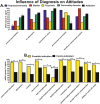Psychedelic perceptions: mental health service user attitudes to psilocybin therapy
- PMID: 34131812
- PMCID: PMC8205319
- DOI: 10.1007/s11845-021-02668-2
Psychedelic perceptions: mental health service user attitudes to psilocybin therapy
Abstract
Introduction: Despite the rapid advance of psychedelic science and possible translation of psychedelic therapy into the psychiatric clinic, very little is known about mental health service user attitudes.
Objectives: To explore mental health service user attitudes to psychedelics and psilocybin therapy.
Methods: A questionnaire capturing demographics, diagnoses, previous psychedelic and other drug use, and attitudes to psychedelics and psilocybin therapy was distributed to mental health service users.
Results: Ninety-nine participants completed the survey (52% female, mean age 42 years). The majority (72%) supported further research, with 59% supporting psilocybin as a medical treatment. A total of 27% previously used recreational psilocybin, with a male preponderance (p = 0.01). Younger age groups, those with previous psychedelic experience, and those with non-religious beliefs were more likely to have favourable attitudes towards psilocybin. A total of 55% of the total sample would accept as a treatment if doctor recommended, whereas 20% would not. Fewer people with depression/anxiety had used recreational psychedelics (p = 0.03) but were more likely to support government funded studies (p = 0.02). A minority (5%) of people with conditions (psychosis and bipolar disorder) that could be exacerbated by psilocybin thought it would be useful for them. One fifth of the total sample viewed psychedelics as addictive and unsafe even under medical supervision. Concerns included fear of adverse effects, lack of knowledge, insufficient research, illegality, and relapse if medications were discontinued.
Conclusions: The majority supported further research into psilocybin therapy. Younger people, those with previous recreational psychedelic experience, and those with non-religious beliefs were more likely to have favourable attitudes towards psilocybin therapy.
Keywords: Attitudes; Hallucinogens; Lysergic acid diethylamide; Psilocybin; Psilocybin therapy; Psychedelics; Psychiatry.
© 2021. The Author(s).
Conflict of interest statement
VO’K is supported by the Health Research Board (HRB) through HRB Grant code: 201651.12553 and the Meath Foundation, Tallaght University Hospital. She is the Principal Investigator (PI) on the COMPASS trials (COMP001, 003, 004) in Ireland. JK is sub-PI on the COMPASS trials (COMP 001, 003, 004) in Ireland. All other authors report no conflicts of interest.
Figures





References
-
- Carhart-Harris RL, Bolstridge M, Rucker J, Day CM, Erritzoe D, Kaelen M, Bloomfield M, Rickard JA, Forbes B, Feilding A, Taylor D, Pilling S, Curran VH, Nutt DJ. Psilocybin with psychological support for treatment-resistant depression: an open-label feasibility study. Lancet Psychiatry. 2016;3(7):619–627. doi: 10.1016/s2215-0366(16)30065-7. - DOI - PubMed
MeSH terms
Substances
LinkOut - more resources
Full Text Sources

